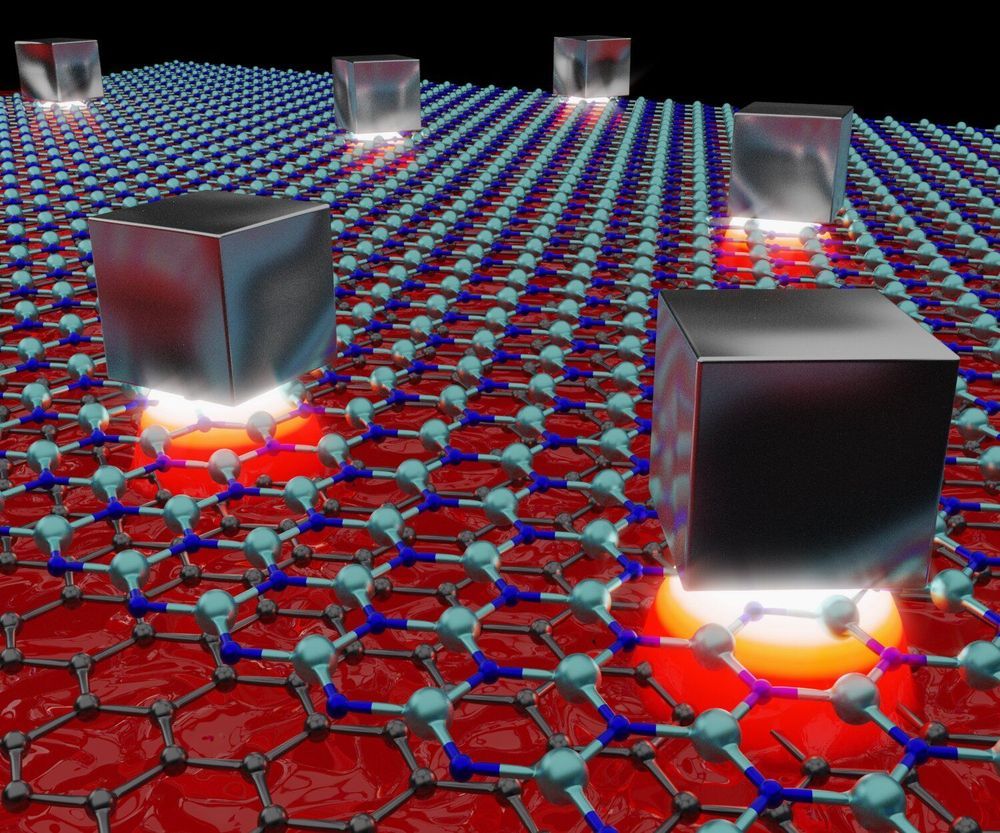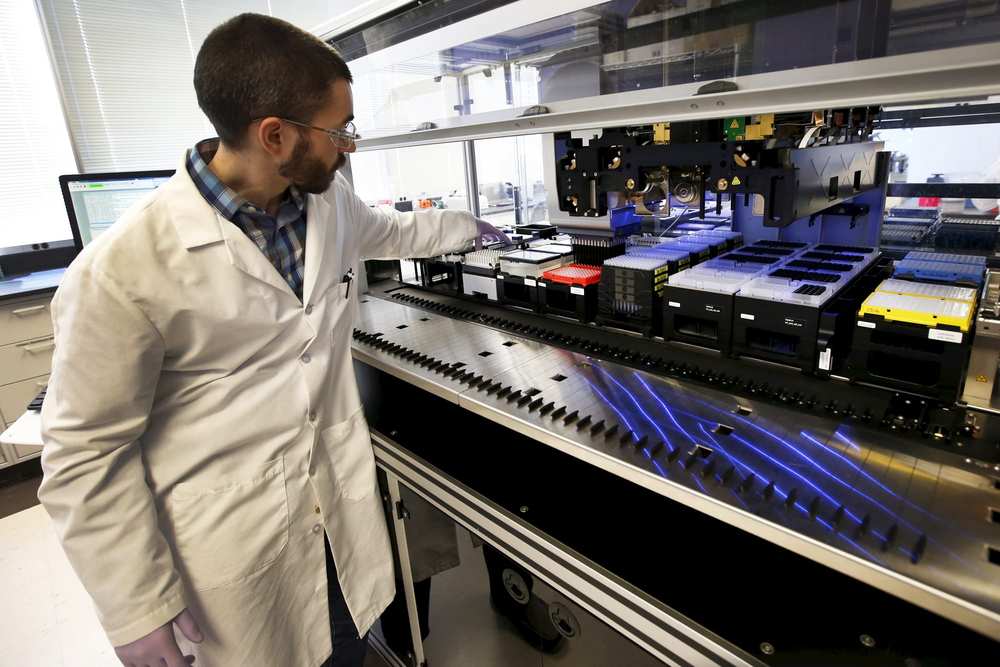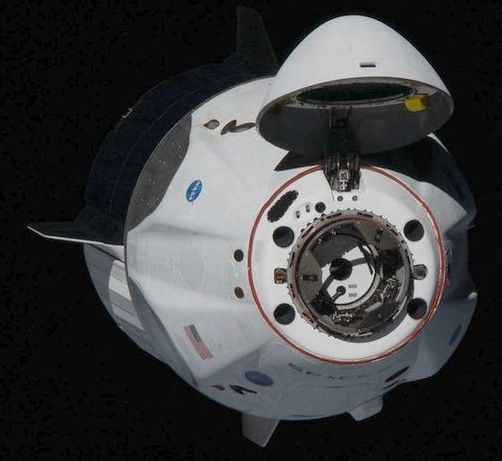Category: health – Page 345
Scientists Find Speed Key to Protecting Astronauts and Satellites From Space Storms
Speed as important as size in predicting potentially damaging impacts of coronal mass ejections.
Space weather forecasters need to predict the speed of solar eruptions, as much as their size, to protect satellites and the health of astronauts, scientists have found.
Scientists at the University of Reading found that by calculating the speed of coronal mass ejections (CMEs) when they hit Earth, forecasters could provide more useful early warnings. This would help operators of critical infrastructure such as satellites know if they need to take evasive action or switch off systems to protect them, and warn astronauts when they need to shelter inside shielded parts of the International Space Station.

Smallest cavity for light realized by graphene plasmons
Miniaturization has enabled technology like smartphones, health watches, medical probes and nano-satellites, all unthinkable a couple decades ago. Just imagine that in the course of 60 years, the transistor has shrunk from the size of your palm to 14 nanometers in dimension, 1000 times smaller than the diameter of a hair.
Miniaturization has pushed technology to a new era of optical circuitry. But in parallel, it has also triggered new challenges and obstacles, for example, controlling and guiding light at the nanometer scale. Researchers are looking for techniques to confine light into extremely tiny spaces, millions of times smaller than current ones. Studies had earlier found that metals can compress light below the wavelength-scale (diffraction limit).
In that aspect, graphene, a material composed from a single layer of carbon atoms, which exhibits exceptional optical and electrical properties, is capable of guiding light in the form of plasmons, which are oscillations of electrons that strongly interact with light. These graphene plasmons have a natural ability to confine light to very small spaces. However, until now, it was only possible to confine these plasmons in one direction, while the actual ability of light to interact with small particles like atoms and molecules resides in the volume into which it can be compressed. This type of confinement in all three dimensions is commonly regarded as an optical cavity.

Regeneron sees ‘a lot of reason for hope’ as human testing of its coronavirus drug begins
Regeneron Pharmaceuticals announced Thursday that it’s started the first clinical trial of its experimental coronavirus antibody drug.
The antibody cocktail is being tested in four human populations. Two groups of people will receive the drug to test its effectiveness as a treatment for Covid-19; the other two will receive it as a possible prevention.
“We’ll be hopefully to quickly test the safety and then start understanding the efficacy for four major different settings of this virus challenge,” Regeneron’s chief scientific officer, Dr. George Yancopoulos, said on CNBC’s “Squawk Box.” Yancopoulos said he thinks that, “if all goes well,” the company could have “definitive data” within a few months on the effectiveness of the antibody cocktail.
“I think there’s a lot of reason for hope,” Yancopoulos said, noting the company’s work on Ebola. But he also stressed the unpredictable nature of science and biology, saying “there’s always reasons to be concerned and to be cautious.” “So we’re going to be moving forward very carefully, hand-in-hand in with the FDA, and we hope sooner rather than later we can get answers that can really make a difference,” he said.
Regeneron is the latest company to begin trials for a potential Covid-19 therapy. Eli Lilly, which began trials of its antibody drug earlier this month, said a treatment could be authorized, if all goes well, for use as early as September. In scientific trials so far, Gilead Sciences’s antiviral remdesivir is the only drug to show some effectiveness in treating the disease. There are more than 7.4 million confirmed cases of Covid-19 in the world, including over 2 million in the U.S., according to the latest data from Johns Hopkins University. More than 417,100 people have died worldwide, with over a quarter of the fatalities in the U.S. Regeneron’s drug is being tested on four distinct types of patients, including “the sickest patients” who are hospitalized and on a ventilator or oxygen support, Yancopoulos said. It’s also being tested to see whether it can prevent high-risk people from contracting the disease, such as health-care workers. The drug, known as REGN-COV2, is a combination of two antibodies. Yancopoulos said Regeneron firmly believes this is the correct approach to treat Covid-19 when using antibodies.
“Just like with conventional, old fashion antiviral drugs, giving one can have enormous benefit initially but it can lead to the selection and the arise of escaped viral mutants, which can could be very dangerous and risky,” he said. “What we showed is that in order to prevent this, you have to give these antibodies in cocktails.”

Psilocybin Alters Brain Levels Of The Neurotransmitter Glutamate — And This Could Explain Why Users Experience “Ego Dissolution”
Recent therapeutic trials of “classical” psychedelic drugs, such as psilocybin (from magic mushrooms) or LSD, have reported benefits to wellbeing, depression and anxiety. These effects seem to be linked to a sense of “ego dissolution” — a dissolving of the subjective boundaries between the self and the wider world. However, the neurochemistry behind this effect has been unclear. Now a new paper, published in Neuropsychopharmacology, suggests that changes in brain levels of the neurotransmitter glutamate are key to understanding reports of ego dissolution — and perhaps the therapeutic effects of psychedelics.
Natasha Mason at Maastricht University, the Netherlands, and colleagues recruited 60 participants for their study. All had taken a psychedelic drug before, but not in the three months prior to the study. Half received a placebo and the other half were given a low to moderate dose of psilocybin (0.17 mg/kg of body weight).
The team then used a technique called proton magnetic resonance spectroscopy (MRS) to look at concentrations of glutamate (as well as other neurochemicals) in the medial prefrontal cortex (mPFC) and the hippocampus — two regions that have been implicated as key to the psychedelic drug experience. The team also looked at patterns of “functional connectivity” within networks of brain regions, a measure of how closely correlated brain activity is across those regions. Six hours after taking the drug or placebo, the participants reported on their subjective experiences using two surveys: The 5 Dimensions of Altered States of Consciousness and the Ego Dissolution Inventory.
As the researchers expected (based on the findings of earlier research), those given the drug reported increased feelings of ego dissolution, as well as altered states of consciousness. They also showed disruptions in the connectivity of particular networks, including the default mode network, which has also been implicated in past work on the effects of psychedelic drugs…
But, for the first time in humans, the team also observed higher levels of glutamate in the mPFC and lower levels in the hippocampus after taking psilocybin — and they linked these changes to different aspects of ego dissolution. Increases in the mPFC were most strongly linked to unpleasant aspects, such as a loss of control over thoughts and decision-making, and also anxiety. Decreases in the hippocampus, meanwhile, were most strongly linked to more positive aspects, such as feelings of unity with the wider world, and of having undergone a spiritual-type experience.
The hippocampus is our most important memory structure. Based on earlier work on the impacts of psychedelic drugs on patterns of brain connectivity, it’s been suggested that a temporary reduction or loss of access to memories about our own lives might contribute to a weakening of the “self”. The new work suggests that changes in glutamate levels in the hippocampus might be key to this process.
But if glutamate rises in the mPFC are linked to unpleasant aspects of ego dissolution, and also to anxiety, how does this fit in with trial results finding that psychedelic drugs can treat anxiety disorders?

This device can read your medical history in a drop of sweat
“ “The monitoring of human health and well-being with the use of wearables is considered critical in the next generation of biomedical devices,” write the authors. “[But] most existing paper-based devices are designed for one-time use only, functioning under relatively intense capillary flow into the paper, which ceases upon saturation… [Our approach] can function as a key part of a platform for long-term sweat sampling and biomarker monitoring.””
Researchers have designed a paper-based wearable device that can monitor your sweat for 10-days at a time to detect important information about your health.

Crew Dragon likely to support extended space station stay
WASHINGTON — SpaceX’s Crew Dragon spacecraft is performing well enough on orbit to give NASA confidence that the mission can last until August, an agency official said June 9.
Ken Bowersox, the acting associate administrator for human exploration and operations at NASA, told an online meeting of two National Academies committees that NASA had been monitoring the health of the Crew Dragon spacecraft since its launch May 30 on the Demo-2 mission, carrying NASA astronauts Bob Behnken and Doug Hurley to the International Space Station.
NASA, he noted, had not set a length for the mission, saying they wanted to see how the Dragon performed in space. “The Dragon is doing very well, so we think it’s reasonable for the crew to stay up there a month or two,” he told members of the Aeronautics and Space Engineering Board and Space Studies Board.

Help for Nicholi
Posted with permission by Eric Klien.
Hello everyone, as some of you may be aware about 6 years ago I was diagnosed with multiple myeloma and I published about it on Lifeboat Foundation’s blog. I was in remission but relapsed about a year ago. Going through radiation therapy as well as chemotherapy has taken its toll on my health and with the recent outbreak of Covid-19 has really put a lot of us in the high risk category. In order to stay safe i have avoided working for 3 months. Because of these unfortunate circumstances I am kindly requesting that anyone who is willing to help me get back on my feet to please help donate to my GoFund me page: https://www.gofundme.com/f/help-for-nicholi…
I sincerely appreciate any and all help available. Thank you! I will post a link to my journey with cancer published on Lifeboat Foundation’s blog.
Due to the circumstances of Covid-19 and my medical condition (cancer) I took 3 month off of work. I am kindly requesting the help of others to help me stay on my feet until I am able to do so. Please message me for any other questions.

Who’s to blame? These three scientists are at the heart of the Surgisphere COVID-19 scandal
I remember questioning this data, as it was not even research on animals, it was observation of people’s medical files.
Three unlikely collaborators are at the heart of the fast-moving COVID-19 research scandal, which led to retractions last week by The Lancet and The New England Journal of Medicine (NEJM), and the withdrawal of an online preprint, after the trove of patient data they all relied on was challenged. The three physician-scientists never were at the same institution nor had they ever before written together, but they are the only authors in common on the disputed papers, and the other co-authors all have ties to at least one of them. Their partnership, which seized a high-impact role during a global public health crisis, has now ended disastrously.
The first author for both retracted papers was cardiac surgeon Mandeep Mehra, an eminent Harvard University professor who works at Brigham and Women’s Hospital (BWH) and is known internationally for cardiovascular medicine and heart transplants. He provided the kind of gravitas that can fast-track papers to leading journals. In a statement provided by BWH, Mehra said he had met another of the trio, cardiac surgeon Amit Patel, in “academic and medical circles,” and that Patel had introduced him to Sapan Desai, a vascular surgeon and founder of Surgisphere, the tiny company that supplied the data. Journal disclosures, however, also indicate Mehra received compensation from Triple-Gene, a gene therapy company Patel co-founded to develop cardiovascular treatments.
Author partnership on coronavirus papers is “completely bizarre” and should have been a red flag, former journal editor says.